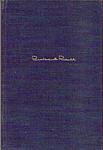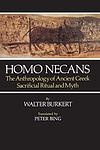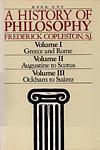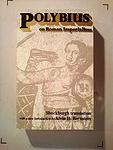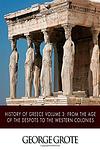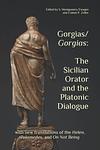The Greatest "Greece, History" Books of All Time
Click to learn how this list is calculated.
This list represents a comprehensive and trusted collection of the greatest books. Developed through a specialized algorithm, it brings together 300 'best of' book lists to form a definitive guide to the world's most acclaimed books. For those interested in how these books are chosen, additional details can be found on the rankings page.
Genres
The "Greece" category of books encompasses literature that is set in or inspired by the country of Greece. This can include historical fiction, mythology, travel writing, and contemporary novels that explore Greek culture, history, and society. These books often feature themes of ancient mythology, philosophy, and the country's rich history, as well as its modern-day struggles and triumphs. The Greece category offers readers a diverse range of stories that capture the essence of this beautiful and complex country.
The category of "History" in books refers to the study and interpretation of past events, societies, and cultures. It encompasses a wide range of topics, including political, social, economic, and cultural developments, as well as the lives of individuals and groups who have shaped the course of history. History books can be written from various perspectives and may focus on specific time periods, regions, or themes. They aim to provide readers with a deeper understanding of the past and its impact on the present.
Countries
Date Range
Reading Statistics
Click the button below to see how many of these books you've read!
Download
If you're interested in downloading this list as a CSV file for use in a spreadsheet application, you can easily do so by clicking the button below. Please note that to ensure a manageable file size and faster download, the CSV will include details for only the first 500 books.
Download-
1. Memoirs of Hadrian by Marguerite Yourcenar
"Memoirs of Hadrian" is a historical novel that presents a fictional autobiography of the Roman Emperor Hadrian, who reigned from 117 to 138 AD. Narrated in the first person, the novel explores Hadrian's ascension to the throne, his administration, his love for the young Antinous, and his philosophical reflections on life and death. The narrative is framed as a letter to his successor, Marcus Aurelius, offering insights into the complexities of power, the nature of leadership, and the human condition.
-
2. The Histories of Herodotus by Herodotus
"The Histories of Herodotus" is an ancient text that provides a comprehensive account of the Greco-Persian Wars. It is often considered the first work of history in Western literature. The author, often referred to as the 'Father of History', provides a narrative that not only discusses the conflicts between the Greeks and Persians, but also delves into the customs, geography, and history of each civilization. This detailed and pioneering work has greatly contributed to our understanding of the ancient world.
-
3. Parallel Lives by Plutarch
"Parallel Lives" is a collection of biographies of famous Greek and Roman figures, written in pairs to draw comparisons between their lives. The work explores the influence of character on the lives and destinies of these historical figures. The biographies are not only a record of the lives of these individuals, but also provide insight into the times in which they lived, offering a unique perspective on the history and culture of the ancient world.
-
4. The History of the Peloponnesian War by Thucydides
This book is a historical account of the Peloponnesian War between the city-states of Athens and Sparta in ancient Greece. The author, an Athenian general, provides a detailed narrative of the war, its causes, and its consequences, offering valuable insights into the political and social dynamics of the time. The work is considered a pioneering piece in the field of history due to its rigorous methodology and critical analysis of events.
-
5. The Mediterranean And The Mediterranean World In The Age Of Philip Ii by Fernand Braudel
This seminal work offers a comprehensive analysis of the Mediterranean region during the 16th century, focusing on the complex social, political, and economic landscapes that defined the era of Philip II of Spain. The book transcends traditional historiography by emphasizing the geographical and ecological factors that shaped human activity, from the ebb and flow of commerce and the patterns of agrarian life to the rise and fall of empires. Through a meticulous study of the Mediterranean world, the narrative weaves together the intricate tapestry of cultures, religions, and power dynamics that characterized the period, providing a vivid portrayal of the enduring influence of the environment on the course of human history.
-
6. The Theogony by Hesiod
"The Theogony" is an ancient Greek epic poem that explores the genealogy of the gods. The narrative begins with the primordial deities Chaos, Gaia, and Eros, then progresses through the generations of Titans, Olympian gods, and mortal heroes. It provides an account of the struggles and power dynamics among these divine beings, culminating in the reign of Zeus as the king of the gods. The poem is a significant source of Greek mythology and offers insights into the ancient Greeks' worldview and their understanding of the universe's origins.
-
7. A History of Western Philosophy by Bertrand Russell
This book provides a comprehensive overview of Western philosophy from the pre-Socratic philosophers through the Middle Ages and the Renaissance, up to the early 20th century. It examines the ideas and contributions of major philosophers, including Plato, Aristotle, Descartes, Spinoza, Leibniz, Locke, Hume, Kant, and others, while also exploring the cultural and historical context in which their thoughts developed. The work is known for its accessible prose and critical perspective, as it not only presents philosophical concepts but also offers the author's analysis and interpretation of these ideas, highlighting their relevance to the broader sweep of human thought and society.
-
8. Homo Necans by Walter Burkert
The book explores ancient Greek rituals and myths, arguing that the acts of sacrifice and hunting were not only rooted in practical needs but also deeply embedded in the psychological and religious aspects of Greek society. It delves into how violence and the sacred were intertwined, suggesting that the ritual killing of animals and sometimes humans served as a foundational mechanism for social cohesion and the establishment of order. Through detailed analysis of historical texts and comparison with other cultures, the work presents a compelling view of how violence in ritual contexts was used to negotiate the complex relationship between the mortal and the divine.
-
9. A History of Philosophy by Frederick Charles Copleston
This book is a comprehensive overview of Western philosophy, starting from the Pre-Socratic philosophers to contemporary thinkers. It meticulously traces the evolution of philosophical thought, providing in-depth analysis of key figures and their contributions. The book also critically examines various philosophical doctrines, their influences, and their relevance to contemporary society. It's a valuable resource for anyone interested in understanding the origins, developments, and complexities of philosophical ideas.
-
10. The Histories by Polybius
"The Histories" is a comprehensive account of the rise of the Roman Empire, focusing on the period from 264-146 BC. The author, a Greek statesman, provides a detailed analysis of the political, military, and social structures of Rome, attributing its success to a balanced constitution and superior military organization. The work also includes first-hand accounts of several significant events, such as the Third Punic War and the Numantine War.
-
11. The Politics by Aristotle
"The Politics" is a foundational text in political philosophy, where the author explores various forms of government and their respective merits and drawbacks. The work delves into the nature of the state, citizenship, and the role of the middle class in achieving political stability. It emphasizes the importance of a constitution that balances the interests of different parts of society and discusses the conditions under which various types of governments can be successful. The author also examines the relationship between politics and ethics, asserting that the main purpose of the state is to promote a good and virtuous life among its citizens.
-
12. History Of Greece by George Grote
This book provides a comprehensive analysis of Greek history, from its earliest periods in ancient times through the Hellenistic era. The author meticulously details the political, social, and cultural developments of various Greek city-states, emphasizing the democratic processes of Athens and the military prowess of Sparta. Through a critical examination of sources and a narrative enriched by philosophical and ethical insights, the work explores the rise and fall of Greece, its interactions with neighboring civilizations, and its lasting impact on Western thought and civilization.
-
13. Persian Fire by Tom Holland
The book provides a riveting historical account of the Greco-Persian Wars, focusing on the rise of the Persian Empire under leaders such as Cyrus the Great and Darius, and its eventual confrontation with the city-states of Greece. It delves into the political, cultural, and military aspects of this ancient clash, highlighting key figures and battles, such as Marathon and Thermopylae. The narrative not only explores the strategies and tactics employed but also the broader implications of the conflict on the development of Western civilization, offering insights into the complex interplay of power and identity in the ancient world.
-
14. Moralia by Plutarch
"Moralia" is a collection of essays and dialogues that delve into various ethical, religious, physical, political, and literary topics, reflecting the author's profound interest in the moral issues of his time. The work is not a single coherent piece but rather an eclectic compilation of thoughts and inquiries, ranging from the proper behavior at a banquet to discussions on the nature of virtue and the influence of superstition. Through these texts, the author explores the conduct of daily life and the philosophical underpinnings of human actions, often drawing on historical examples and the wisdom of Greek and Roman thinkers to illustrate his points. The collection serves as a rich source of insight into the intellectual climate of the early Imperial period and the enduring questions of human morality.
-
15. Gorgias/Gorgias : The Sicilian Orator And The Platonic Dialogue by Coleen P. Zoller, Jurgen R. Gatt, S. Montgomery Ewegen
This book provides a comprehensive analysis of the Platonic dialogue centered on the figure of Gorgias, a renowned Sicilian orator and sophist. It delves into the philosophical conversations between Socrates and Gorgias, along with other interlocutors, exploring themes such as rhetoric, justice, and the nature of the good life. The text examines the intricacies of Socratic dialectic and the contrast between philosophical inquiry and the art of persuasion practiced by sophists. Through this exploration, the book sheds light on the enduring questions about the relationship between power, knowledge, and ethics in the context of human discourse and action.
Reading Statistics
Click the button below to see how many of these books you've read!
Download
If you're interested in downloading this list as a CSV file for use in a spreadsheet application, you can easily do so by clicking the button below. Please note that to ensure a manageable file size and faster download, the CSV will include details for only the first 500 books.
Download





